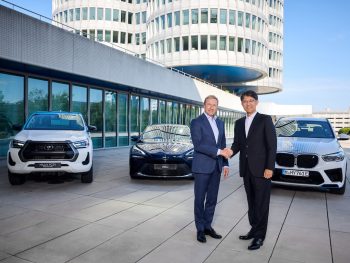BMW to launch first hydrogen car in 2028 under Toyota collaboration
BMW has confirmed plans to launch its first mass-production hydrogen fuel cell electric car in 2028 using technology from its collaboration with Toyota.
The inaugural vehicle is expected to be a production version of the iX5 Hydrogen SUV already piloted in the UK, while Toyota and BMW Group will also work on equipping more cars with fuel cell systems.
Oliver Zipse, CEO of BMW, commented: “This is a milestone in automotive history: the first-ever series production fuel cell vehicle to be offered by a global premium manufacturer. Powered by hydrogen and driven by the spirit of our cooperation, it will underscore how technological progress is shaping future mobility. And it will herald an era of significant demand for fuel cell vehicles.”
Toyota and BMW have been working together for more than a decade and are currently cooperating on development of a third-generation fuel cell system. This will be installed in both carmakers’ models, offering customers a broad range of fuel cell electric vehicles (FCEVs).
In the latest stage of their agreement, the two auto giants are also working together on the development of fuel cell systems and improving infrastructure “with a view to creating a hydrogen society and achieving overall carbon neutrality”.
Both carmakers have the common goal of offering another zero-emission mobility solution.
BMW has previously said there is a role for a fuel-cell powered future alongside battery-electric vehicles for future net zero mobility.
Speaking last year, BMW CEO Oliver Zipse said: “Hydrogen is the missing piece in the jigsaw when it comes to emission-free mobility. One technology on its own will not be enough to enable climate-neutral mobility worldwide.”
BMW Group and Toyota signed an agreement in December 2011 to establish a mid- to-long-term cooperative relationship in environmental technology and have been working on developments including fuel cells and sports cars under a shared vision of “realising a hydrogen society”.
Under the new phase of their collaboration, Toyota and BMW will encourage sustainable hydrogen supply by creating demand and working closely with hydrogen-producing companies, as well as distribution and refuelling facilities, to ensure a stable hydrogen supply and reduce costs.
Koji Sato, Toyota president, said: “In our long history of partnership, we have confirmed that BMW and Toyota share the same passion for cars and belief in ‘technology openness’ and a ‘multi-pathway’ approach to carbon neutrality. Based on these shared values, we will deepen our collaboration in efforts such as the joint development of next generation fuel cell systems and the expansion of infrastructure, aiming for the realisation of a hydrogen society. We will accelerate our efforts together with BMW and partners across various industries to realise a future where hydrogen energy supports society.”
Toyota has been investing in its fuel cell technology for over 30 years and introduced the world’s first production hydrogen-powered car in 2014 in the form of the Mirai saloon. It’s currently working on a hydrogen version of its Hilux pickup.
The OEM has positioned hydrogen as a key energy source in its efforts to achieve carbon neutrality. It’s focusing on a multi-pathway approach that includes FCEVs, battery electric vehicles (BEVs), hybrid electric vehicles (HEVs) and plug-in hybrid electric vehicles (PHEVs).
Toyota expects Europe to be one of the largest hydrogen fuel cell markets by 2030, with steady growth in mobility and power generation applications.


